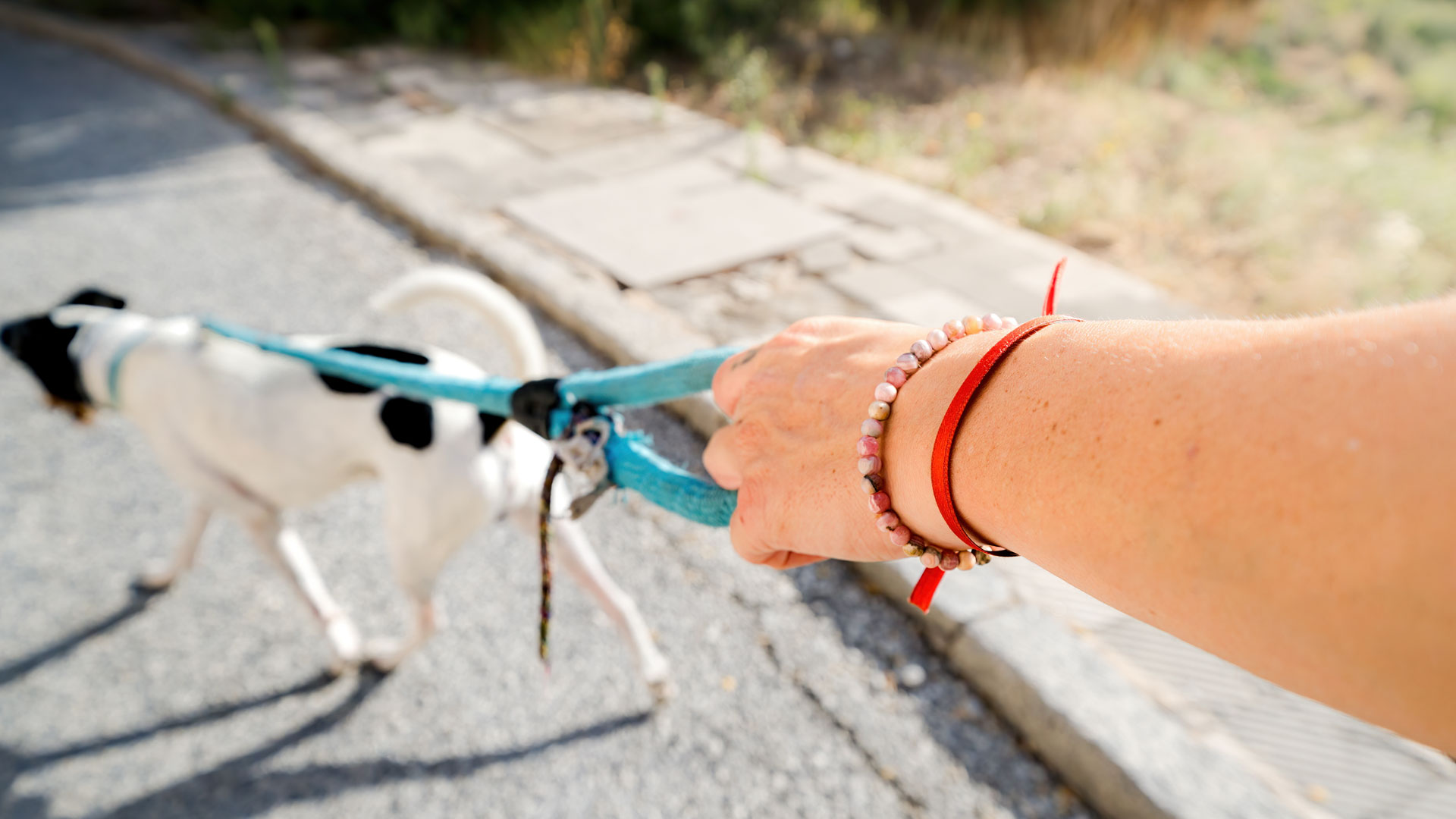5 mistakes I made with my reactive dog that you'll want to avoid
I rescued a reactive puppy – here are some things I wish I didn’t do

Get the best advice, tips and top tech for your beloved Pets
You are now subscribed
Your newsletter sign-up was successful
If you have a reactive dog, I know how stressful it can be – especially when you have no experience managing this challenging behavior. Don't worry; you can learn about the worst mistakes I made with my reactive dog before I trained as a dog behaviorist.
I rescued Jessie, a border collie, when she was four months old. The rescue shelter didn't know much about her background, and she met with my two dogs without issues, so we bought her home.
Although this story dates back to early 2010, I'm still embarrassed and ashamed of how I dealt with Jessie's behavior. The only positive was that my experience with Jessie led me to train as a dog behaviorist (and hopefully, others can learn from it too).
I was determined not to make the same mistakes when I rescued Poppy, a highly reactive Weimaraner cross, in 2011.
Dogs had shared my life for fifty years and were all friendly and well-adjusted. Coping with a reactive dog was a shock because I believed I was a good dog trainer, but Jessie showed me how little I knew.
During the 18 months that Jessie was with us, she attacked several dogs and bit three people. I made many mistakes, but the following are the ones that impacted my dog the most.
Mistakes I made with my reactive dog
1. Exposing my reactive dog to her fears
My first mistake was not understanding dog fear periods, which, according to the National Library of Medicine, are critical development periods when young dogs may become more fearful of stimuli.
Get the best advice, tips and top tech for your beloved Pets
Jessie was just over six months old when we took her to a busy canicross event (running with dogs). Up to this point, her behavior had been "normal." However, when we got her out of the car, Jessie began barking and lunging at other dogs.
Instead of taking Jessie to a quieter place in the field or back to the car, I took her to the busy start line.
I'm crying as I write these words because I now know what I did that day was utterly terrifying for Jessie. At the start line of the race, the noise level was crazy. Dogs were hyper-excited and barking, and music was playing loudly.
I understand now that what I did is called 'flooding' : exposing a dog to their fears. Now, I know that flooding is never the answer to any behavior. Imagine someone you love forcing you to confront your worst fear.
2. Not managing my emotions
I was embarrassed by Jessie's behavior because it made me feel inadequate as a dog trainer. People were quick to judge us, and I got angry with Jessie in public because I wanted to show people I disapproved of her behavior. Honestly, I had no idea how to cope, and the more emotional I became, the more Jessie's reactivity escalated.
2. Walking Jessie with my other dogs
At the time, we had three other crossbreed dogs. They were all well-behaved, but Ellie, a Labrador cross collie, eventually began reacting to Jessie's behavior, telling her off and lunging at dogs when she did.
My elderly whippet cross stopped wanting to walk with us. Poppy, the newly acquired Weimaraner cross, began showing reactive behavior, escalating over six months, and becoming another problem to manage.
Walking separately from your other dogs is best if you have a reactive dog. It enables you to focus on a training session without distraction. It also stops your other dogs from experiencing the stress of your responses and the reactive dog's heightened emotions.
4. Mistaking fear reactivity for aggression
Everyone told us that Jessie was aggressive, even dog trainers. I attended one training class that insisted we sit on a stage in the hall away from the other dogs, and they shuffled us out a back door when we left.
If Jessie were off-leash and saw a dog on the far horizon, she would run away from us and attack the dog. I kept her on the lead unless I could see a reasonable distance ahead, but sometimes, I got caught out.
Her nemesis was a Jack Russell named Rhubarb, whose owner walked through my horse's field. The dogs had several spats, and it was always "Jessie's fault", even though this man did nothing to help our situation by entering the field and not shouting to tell me he was there.
One thing you may have noticed with your reactive dog is how people label your dog as aggressive, and if dog trainers do the same, you eventually believe dog aggression is the problem.
When Jessie bit my fiancé's adult daughter out of the blue, it further confirmed my assessment that her behavior was aggression. Poor Jessie had nobody in her corner, and I'm still ashamed I didn't know how to help her.
5. Constantly trying to control reactive behavior instead of seeking education
I cut myself a little slack for this mistake because how can you know what you don't know? I worked with three dog trainers, who all labeled Jessie aggressive. They were all judgemental and gave me no tools or advice for managing or improving her behavior.
It wasn't until Poppy began showing reactive behavior that I considered training as a dog behaviorist. Poppy was a big dog and pulled me over several times. I'd had enough and couldn't cope with two dogs presenting challenging behavior.
After qualifying as a dog behaviorist, I understood that managing a reactive dog's environment is the first step to rehabilitation. The second step is to learn to manage our emotions and responses regarding the behavior.
Jessie's story had a happy ending. Sadly, it didn't end with me. My dog trainer, Nicki, fell in love with Jessie during classes. Jessie was delighted when Nicki took her off me in class when I sometimes burst into tears because I couldn't cope with her reactive outbursts.
Nicki offered to give Jessie a home with her nine dogs, and after a three-week trial, Jessie never came home.
Giving up my dog was heartbreaking, but seeing her happy in Nicki's many photographs and videos assured me I'd made the right decision for her.
Jessie was the first and last dog I "messed up" because I lacked knowledge.
Sharing my life with her led me to become a better person and dog trainer. The experience with Jessie helped me to develop a deep bond with Poppy and transform her into a well-balanced and happy dog.
My final words are to say don't struggle alone. Find a dog behaviorist who specializes in reactivity and someone who uses positive training methods. It's absolutely possible to rehabilitate a reactive dog with proper guidance.
You might also want to read: Five useful things I've learned as the owner of a reactive dog and how I navigate the social challenges of owning a reactive dog.

Jan is a dog behaviorist and writer living in the Cotswolds, UK. She has shared her life with dogs for over fifty years and is fascinated by behavior. She enjoys helping people better understand their dogs to develop a deep bond and enjoy time together. Jan particularly enjoys working with impulsive and reactive dogs as her legacy from helping Poppy, her rescue Weimaraner cross overcome fear reactivity.
Edited by Megan Milstead.
This page was last updated in March 2025 by Jan Barley.

Jan is a dog behaviorist and writer living in the Cotswolds, UK. She qualified as a dog behaviorist in 2012 after training with Sarah Whitehead, a Certified Clinical Animal Behaviorist with a MSc in Animal Behavior. Jan has shared her life with dogs for over fifty years and is fascinated by behavior. She enjoys helping people better understand their dogs to develop a deep bond and enjoy time together. Jan particularly enjoys working with impulsive and reactive dogs as her legacy from helping Poppy, her rescue Weimaraner cross overcome fear reactivity.
